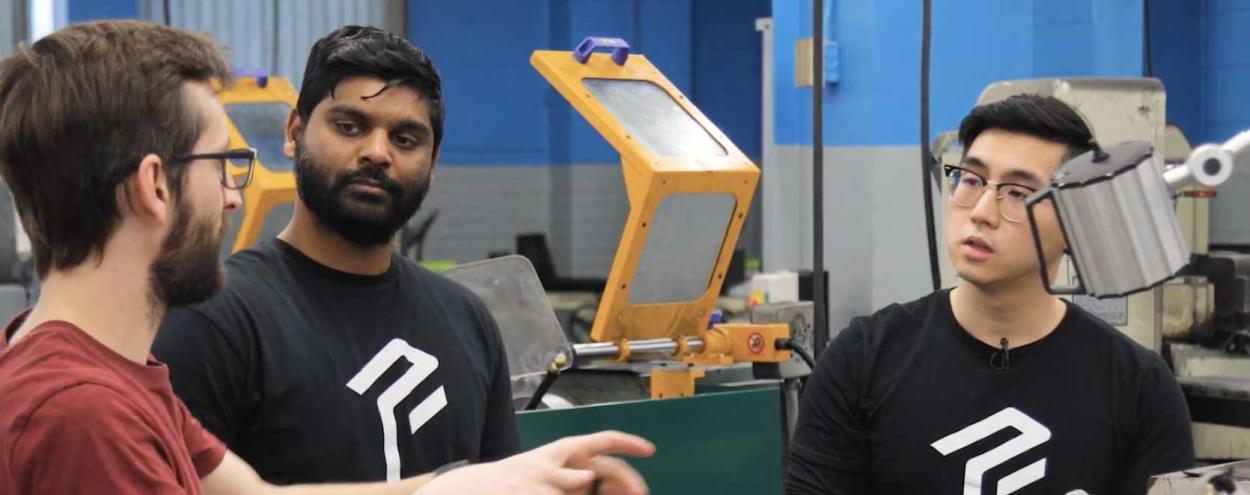
This article appears in the print edition of the National Post and on innovatingcanada.ca.
As it’s one of Canada’s top 10 research colleges, organizations of all sizes want to work with George Brown College (GBC), from startups to established leaders in their sector. As a leading polytechnic institution, the college brings a unique combination of business acumen, manufacturing know-how, and deep connections to local industry and community.
Reducing plastic waste through innovative manufacturing design
Plastic waste presents a massive challenge. It’s everywhere — on the side of the road, in waterways, and on shorelines, and microplastics have even been found in our bodies. Canadians throw about three million tonnes of plastic away every year, and less than 10 per cent of it is recycled.
That’s where GBC Research and Innovation comes in. We worked with Toronto startup Plastic Flux to tackle the plastic waste problem from a hyper-local angle. Plastic Flux co-founders Hanson Wong and Mohesan Sreekuladevan aimed to turn unrecyclable black plastics into useful household goods, like furniture and other items. The City of Toronto doesn’t accept black plastics in its blue bin recycling program because optical sorting technology doesn’t recognize it. Wong and Sreekuladevan worked with the GBC Research and Innovation’s Advanced Manufacturing and Prototyping lab to develop a custom machine — a sheet press for shredded black plastic — to transform this trash into treasure.
GBC is proud to be a part of the solution by providing support services and real-world learning opportunities for the next generation of sustainable leaders in this sector.
“Located in downtown Toronto, the Advanced Manufacturing and Prototyping lab offers end-to-end product development services, including early-stage support, prototype design, and assessment services,” says GBC’s Associate Vice-President of Research and Innovation Krista Holmes. “If you have an idea, we can help make it a reality. The Plastic Flux project and other product development work with partners in the advanced prototyping, food and beverage, and textile and apparel industries demonstrate the positive impact GBC can have on your organization.”
Powering new solutions
GBC’s Food Innovation and Research Studio (FIRSt) works with small- and medium-sized businesses in the Toronto area to develop, improve, and scale up production — taking tasty product ideas and helping businesses get them onto store shelves.
This spring, FIRSt received $1.75 million of Technology Access Centres funding over five years from the Natural Sciences and Engineering Research Council of Canada. These funds allow FIRSt, currently in its twelfth year of operation, to expand its research and development efforts and serve even more clients.
Contributing to a sustainable fashion industry
GBC Research and Innovation continues to contribute to the growth of a more sustainable textile and garment industry at the Textile and Garment labs and our Fashion Exchange. We recently partnered with Canadian fashion retailer Joe Fresh to tackle textile waste, a significant source of landfill waste, during a two-year research project. GBC researchers studied cellulosic fibre regeneration — dissolving and regenerating cellulosic textile waste and transforming it into new fibre — to close the loop in the circular economy of clothing and other items that may otherwise be discarded.
And at our Fashion Exchange, we help small businesses and up-and-coming designers with sustainable manufacturing (sample services and small production runs), testing, and other services.
“The textile, apparel design, and manufacturing industries face steep challenges when it comes to reducing waste and incorporating more ethical and sustainable practices. GBC is proud to be a part of the solution by providing support services and real-world learning opportunities for the next generation of sustainable leaders in this sector,” says Holmes.
Developing technologies for vulnerable populations
Research and Innovation continues to work with long-time partner Quantum Robotic Systems (QRS), an Ontario tech company, to develop service robots for vulnerable populations. The GBC team helped QRS develop its stair-climbing domestic service robot, ROSA, which will be an assistive device for seniors, disabled persons, and caregivers.
Product development is one facet of the wide range of research and innovation activities involving GBC students, expert researchers, and industry and community partners.
Learn more at georgebrown.ca/research-innovation.

